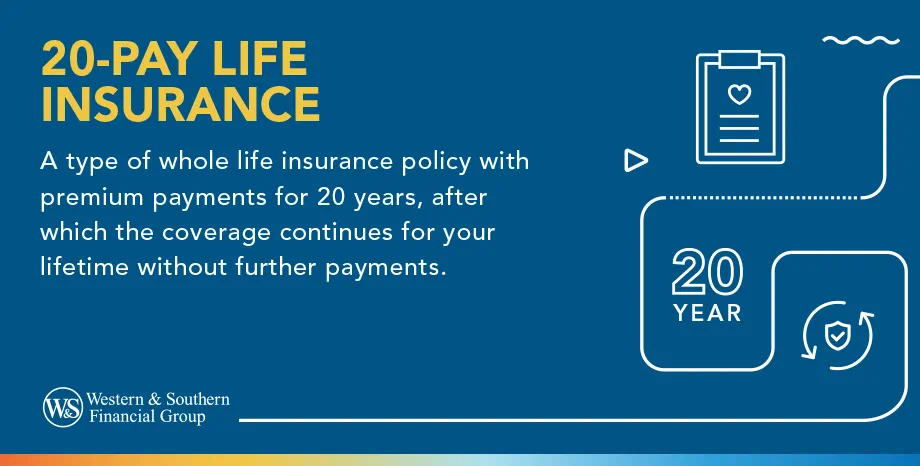

Key Takeaways
- Pay premiums for only 20 years and enjoy protection for your entire life.
- Accumulate cash value you can borrow against or withdraw for future needs.
- Expect higher premiums compared to term life insurance due to the shorter payment period.
- Achieve financial freedom sooner by completing premium payments earlier in life.
- Provides a stable financial tool for retirement planning and leaving a legacy for loved ones.
What is 20-Pay Life Insurance?
20-Pay Life Insurance is a type of whole life insurance policy where you pay premiums for only 20 years. After this period, your policy is considered “paid-up,” meaning you no longer owe premiums, but the coverage and benefits last your entire lifetime.
This permanent coverage makes it an attractive choice for individuals who want lifetime protection without the long-term financial commitment of paying premiums indefinitely.
For example, let’s say you purchase a 20-Pay Life Insurance policy at the age of 30. By the time you turn 50, your premium payments will be complete, yet the policy’s benefits, including its cash value growth, continue until you pass away.
Pros: Benefits of 20-Pay Life Insurance
Choosing 20 Pay Life Insurance has several advantages that make it a popular choice for individuals seeking a balance of lifetime coverage and financial flexibility. Here are the key benefits:
- Lifetime Coverage: Unlike term life insurance, which expires after a specific term, 20 Pay Life Insurance offers permanent protection for your entire life.
- Limited Payment Period: With payments limited to 20 years, you can enjoy financial freedom sooner while maintaining coverage.
- Cash Value Growth: This policy builds cash value over time, which you can borrow against or use as a financial resource in retirement.
- Estate Planning Advantages: The death benefit can cover estate taxes or be an inheritance for your loved ones.
- Tax Benefits: The cash value grows on a tax-deferred basis, and the death benefit is typically tax-free for your beneficiaries.
Cons: Drawbacks of 20-Pay Life Insurance
- Higher Premiums: The shorter payment period results in significantly higher premiums compared to other life insurance options, which may not be affordable for everyone.
- Opportunity Cost: The funds allocated to higher premiums might have been invested elsewhere for potentially greater returns.
- Complexity: Understanding the policy’s cash value growth, dividends, and loan options can be overwhelming for some policyholders without financial expertise.
- Limited Flexibility: Once the payment structure is locked in, there is little room for adjustment if your financial circumstances change.
- Suitability Concerns: It may not be the best option for individuals with short-term coverage needs or those prioritizing lower premiums over lifetime benefits.
20-Pay Life Insurance vs. 10-Pay Life Insurance
Both 20 Pay Life Insurance and 10 Pay Life Insurance are limited pay policies designed to offer lifetime coverage. The key difference lies in the payment period and premium costs. Here’s how they compare:
| Feature | 20-Pay Life Insurance | 10-Pay Life Insurance |
|---|---|---|
| Payment Period | 20 years | 10 years |
| Premium Cost | Moderate | High |
| Cash Value Growth | Builds steadily | Builds more rapidly |
| Affordability | More affordable | Requires higher income |
| Ideal Candidate | Individuals seeking balance between affordability and payment period | Those looking for a very short payment period and can afford high premiums |
Example: A 35-year-old professional considering 20-Pay Life Insurance would pay premiums for 20 years and achieve a paid-up policy by age 55. Meanwhile, choosing a 10-Pay Life Insurance policy would require higher annual premiums but would allow the individual to complete payments by age 45.
Who Should Consider 20-Pay Life Insurance?
This limited-pay permanent life insurance policy is ideal for individuals who:
- Want to help ensure lifetime coverage without the burden of long-term premium payments.
- Are looking for a stable financial tool that builds cash value over time.
- Are in their 20s to 40s and can afford higher premiums in exchange for completing payments earlier.
- Need a reliable way to supplement their retirement or estate planning goals.
How Does 20-Pay Life Insurance Compare to Other Policies?
| Feature | 20-Pay Life Insurance | Whole Life Insurance | Term Life Insurance |
|---|---|---|---|
| Payment Period | 20 years | Lifetime | Specified term (e.g., 20 years) |
| Coverage | Lifetime | Lifetime | Term-limited |
| Cash Value | Yes | Yes | No |
| Premium Cost | Higher for shorter-term | Spread over lifetime | Lower |
| Flexibility | Paid-up after 20 years | Requires lifetime payments | No cash value or flexibility |
Real-Life Example of 20-Pay Life Insurance
Imagine a couple, Mark and Sarah, both in their early 30s. They recently had their first child and want to help ensure financial security for their family. After evaluating their options, they choose a 20 Pay Life Insurance policy with a $500,000 death benefit.
Although their premiums are higher than those of a typical term life policy, they like the idea of having lifetime coverage without worrying about payments once they reach their 50s. Additionally, by the time they retire, the cash value from their policy can serve as a supplemental income source.
Factors to Consider When Choosing a 20-Pay Life Insurance Policy
- Affordability: Premiums for 20 Pay Life Insurance are higher than traditional whole life insurance due to the shorter payment period. Ensure the cost fits within your budget.
- Coverage Needs: Assess your financial goals, such as debt repayment, income replacement, or estate planning, to determine the appropriate coverage amount.
- Cash Value Growth: Look at the projected growth of the policy’s cash value and how it aligns with your long-term financial plans.
- Dividends: Some policies pay dividends, which can be used to increase the death benefit, reduce premiums, or accumulate cash value.
How to Maximize the Benefits of 20-Pay Life Insurance
- Start Early: The younger you are when purchasing the policy, the lower your premiums will be.
- Review Policy Riders: Consider adding riders like a waiver of premium, which covers your premiums if you become disabled.
- Monitor Cash Value Growth: Regularly review your policy’s performance to ensure it meets your financial expectations.
- Consult a Financial Advisor: Work with a professional to determine how this policy fits into your broader financial plan.
Is 20-Pay Life Insurance Right for You?
20-pay life insurance presents a compelling option for those seeking lifelong protection with the convenience of a shorter payment period. While it may require higher initial premiums, long-term financial security, and cash value accumulation benefits can make it a worthwhile purchase.
See how 20-Pay Life Insurance can help protect your family for life. Get a Free Life Insurance Quote
Frequently Asked Questions
What happens after I finish paying premiums for 20 years?
Can I borrow against the cash value?
Are the premiums fixed?
Footnotes
- Life insurance products are not bank products, are not a deposit, are not insured by the FDIC nor any other federal entity, have no bank guarantee, and may lose value.


































